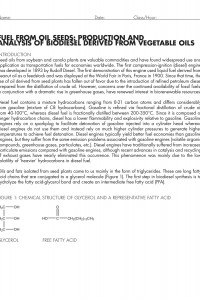Oil seeds represent a sizable fraction of the feedstocks that are used to generate biodiesel fuel today. In this lab investigation, students will use oil derived from seed plants (canola and soy) to synthesize biodiesel fuel. Students may also utilize used cooking oil (canola and soy) for biodiesel conversion. Students will then analyze each fuel for yield, purity (freezing point test), combustibility, and particulate formation (during combustion).
Learning Objectives
Upon completion, students will be able to:
- Conduct and understand a transesterification reaction.
- Evaluate and determine the ‘best’ feedstock to use for biodiesel fuel using qualitative parameters of purity, yield, and combustion particulate analysis.
| Download the Full Package |
Concepts/Skills
Phase Changes, Energy Content, Fuel Production
Prior Knowledge
Basic chemistry concepts (molarity, percent yield, etc.)
Time Required
Two 90-minute sessions
Required Supplies
Soybean oil, canola oil, methanol, NaOH solid, beakers, Erlenmeyer flasks, magnetic stir bar and plate, hot plate, Q-tips, bunsen burner, ice bath, NaCl solid, acetic acid, separatory funnel, thin stem funnels, centrifuge

